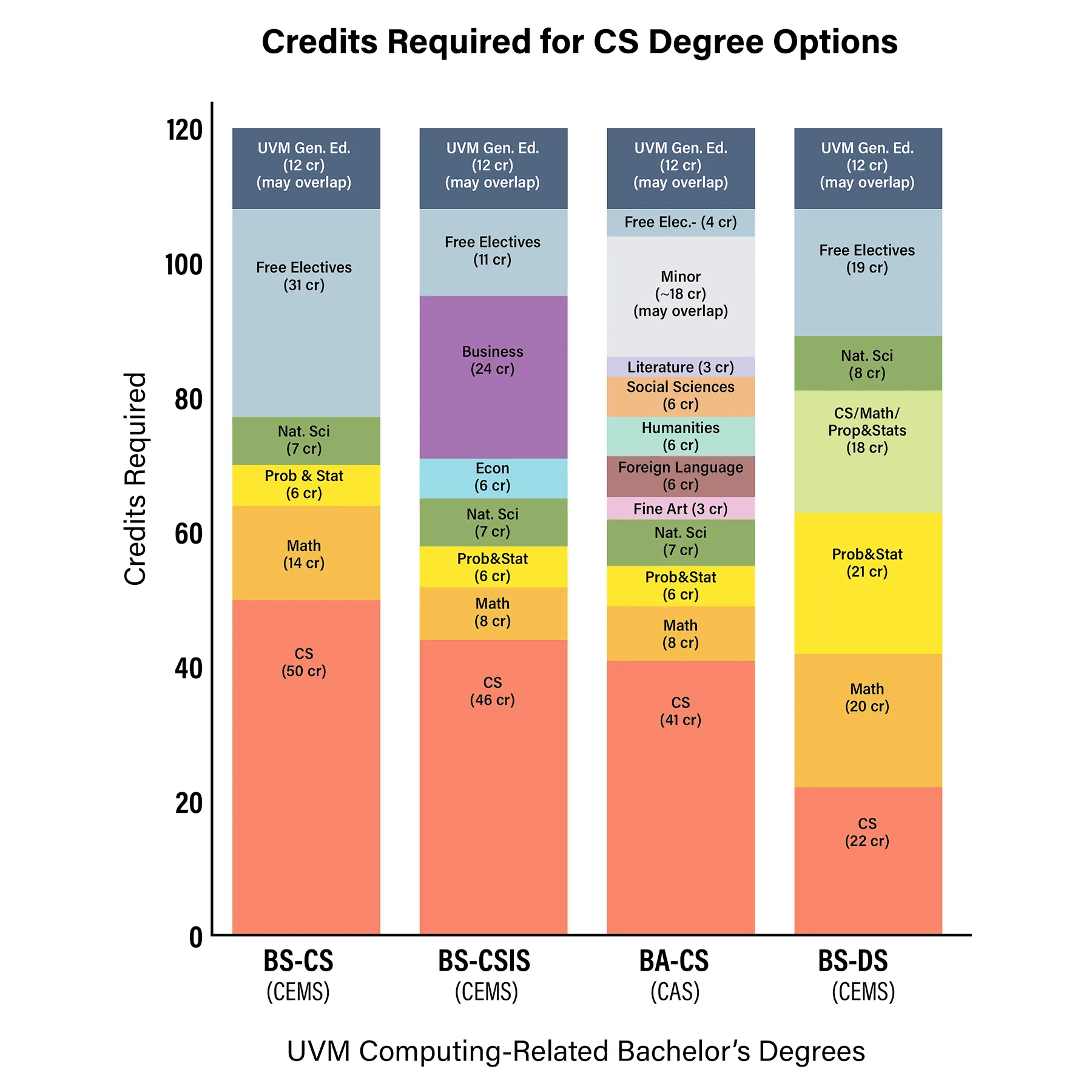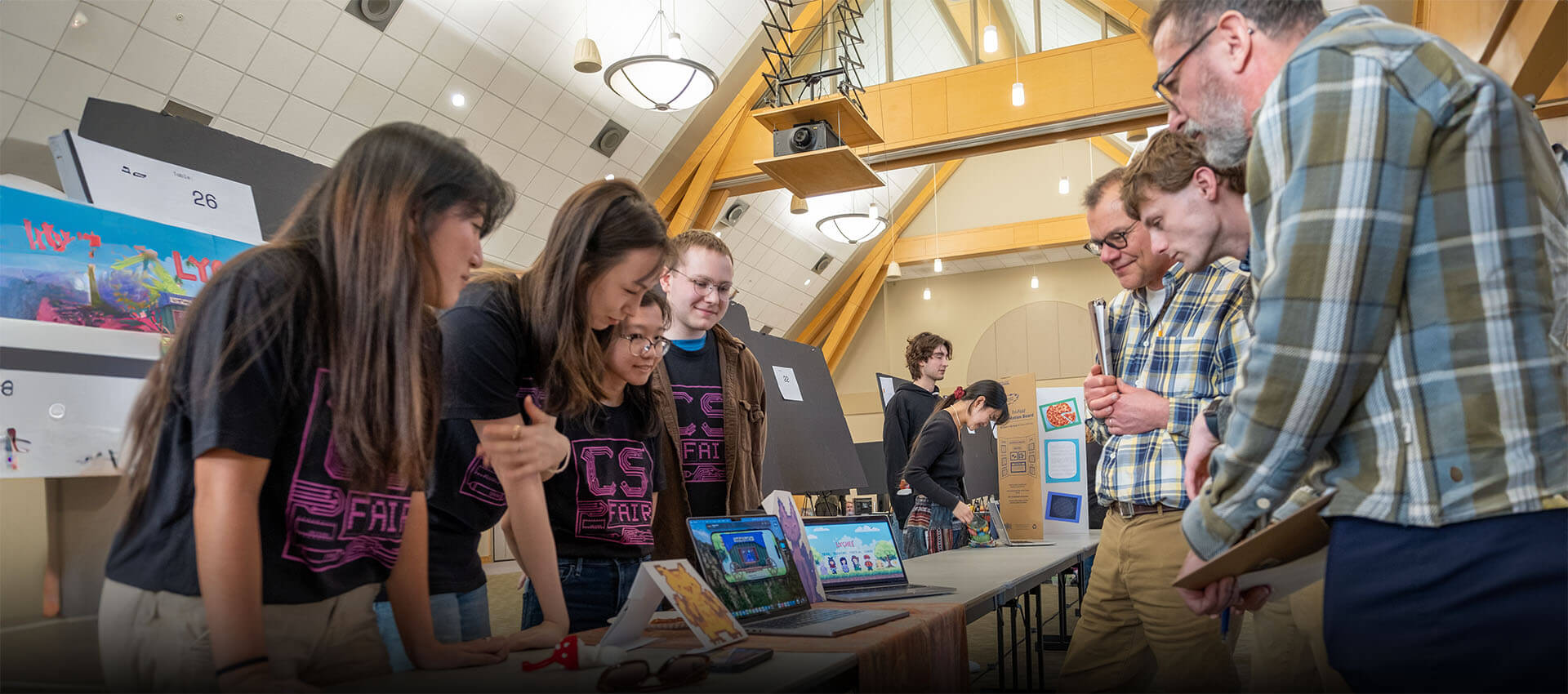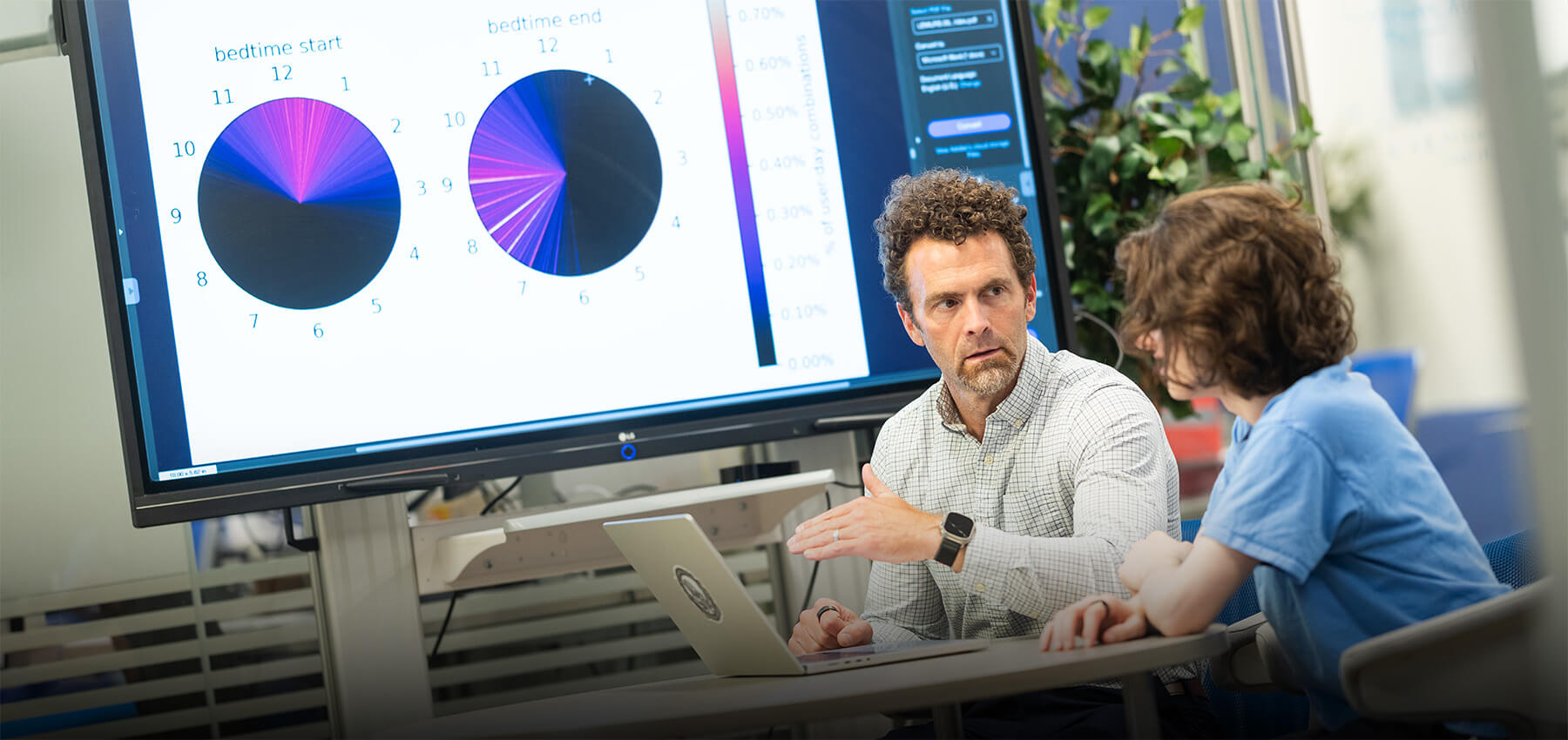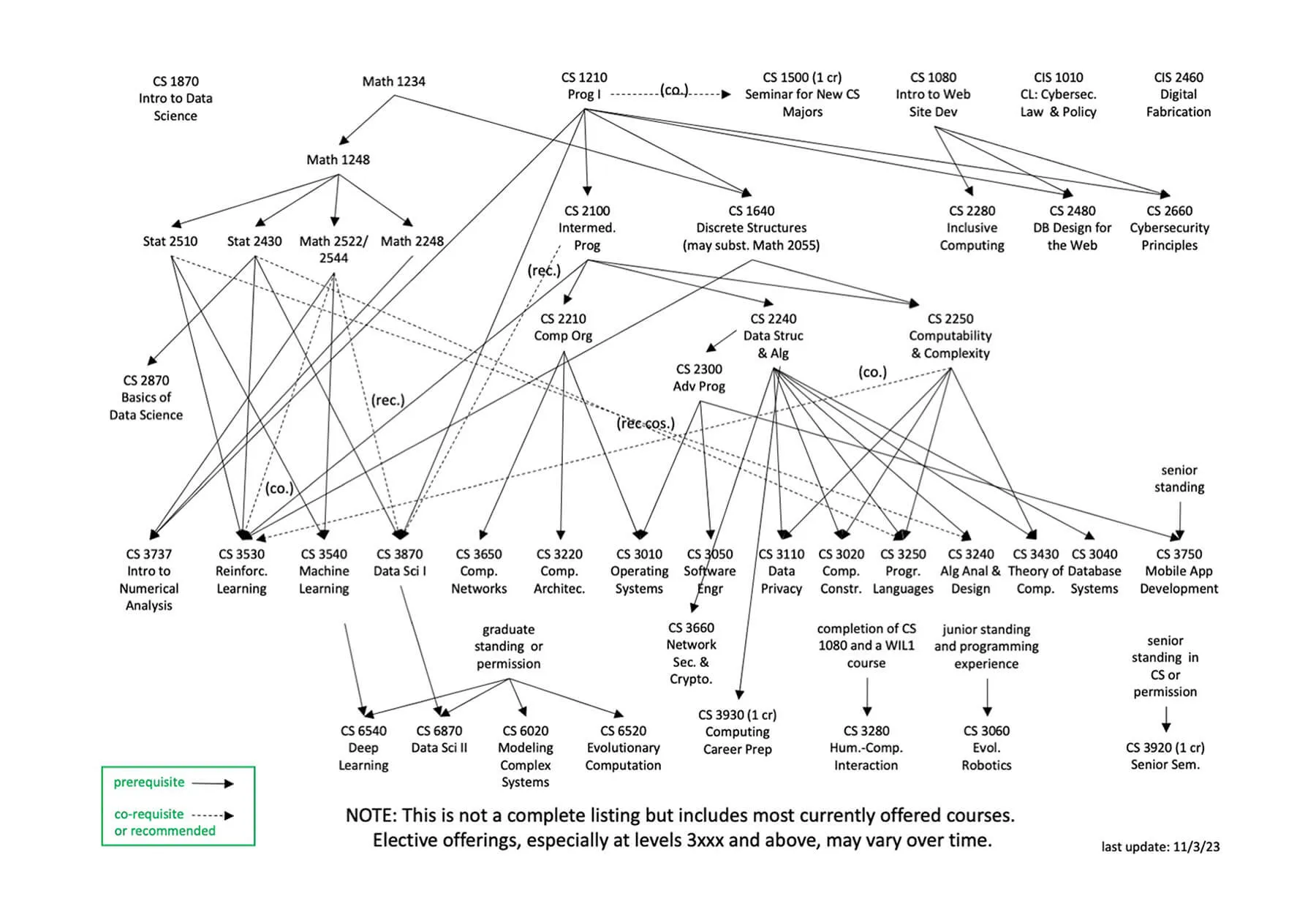Undergraduate Degree Programs
B.A. in Computer Science
In addition to the B.S. degrees based in the College of Engineering and Mathematical Sciences, the University offers a B.A. degree in the College of Arts and Sciences (CAS).
This program provides a computer science major in the context of a liberal arts education. Students are required to complete a minor and take courses in humanities, social sciences, fine arts, literature, and foreign languages.
Minor in Computer Science
The Minor in Computer Science is a cross-college minor available in the Department of Computer Science to all UVM students.
Minor in Computer Science Education
The Minor in Computer Science Education is offered through the College of Education and Social Services (CESS) and provides a deeper understanding of computational thinking and its role in transforming education as you learn innovative ways to integrate computer science into your professional practice

Credits Required for CS Degree Options
See below for the Computer Science degree credit requirements chart data in easily accessible tables.
Download the credit requirement chart (PDF)Computer Science Degree Credit Requirements
B.S. in Computer Science (BS-CS)
This program provides the most depth in computing and mathematics, but also the most flexibility in the remaining electives. Graduates are well-prepared for computing careers in industry or further graduate study in computer science. A minor is encouraged, but not required.
A minimum of 120 credits are required and must include the following:
| Courses | Credit Required |
|---|---|
| Computer Science | 50 Credits |
| Math | 14 Credits |
| Probability and Statistics | 6 Credits |
| Natural Sciences | 7 Credits |
| Free Electives | 31 Credits |
| UVM General (may overlap) | 12 Credits |
B.S. in Computer Science and Information Systems (BS-CSIS)
This program combines a computer science major with the business core (more than a minor, less than a 2nd major) and prepares students to work in a business environment or pursue an MBA.
A minimum of 120 credits are required and must include the following:
| Courses | Credit Required |
|---|---|
| Computer Science | 46 credits |
| Math | 8 credits |
| Probability and Statistics | 6 credits |
| Natural Sciences | 7 credits |
| Economics | 6 credits |
| Business | 24 credits |
| Free Electives | 11 credits |
| UVM General (may overlap) | 12 credits |
B.S. in Computer Science and Information Systems undergraduate catalogue listing
B.A. in Computer Science (BA-CAS)
This program provides a computer science major in the context of a liberal arts education. Students are required to complete a minor as well as take courses in humanities, social sciences, fine arts, literature, and foreign language.
A minimum of 120 credits are required and must include the following:
| Courses | Credit Required |
|---|---|
| Computer Science | 41 credits |
| Math | 8 credits |
| Probability and Statistics | 6 credits |
| Natural Sciences | 7 credits |
| Fine Art | 3 credits |
| Foreign Language | 6 credit |
| Humanities | 6 credits |
| Social Sciences | 6 credits |
| Literature | 3 credits |
| Minor (may overlap) | ~18 credits |
| Free Electives | 4 credits |
| UVM General (may overlap) | 12 credits |
B.S. in Data Science
This transdisciplinary program provides students with a strong education at the intersection of computer science, mathematics, and statistics as a foundation for making sense of the plethora of Big Data now prevalent in virtually all application domains. A minor is encouraged but not required.
A minimum of 120 credits are required and must include the following:
| Courses | Credit Required |
|---|---|
| Computer Science | 22 credits |
| Math | 20 credits |
| Probability and Statistics | 21 credits |
| CS/Math/Probb & Stats | 18 credits |
| Natural Sciences | 8 credits |
| Free Electives | 19 credits |
| UVM General (may overlap) | 12 credits |
Additional CS Degree Resources
Bachelor of Science in Computer Science (B.S. CS)
This program provides the most depth in computing and mathematics, but also the most flexibility in the remaining electives. Graduates are well-prepared for computing careers in industry or further graduate study in computer science. A minor is encouraged, but not required.
Offered through the College of Engineering & Mathematical Sciences (CEMS), which offers strong support for professional development, including a dedicated internship coordinator.
Bachelor of Science in Computer Science and Information Systems (B.S. CSIS)
This program combines a computer science major with the business core (more than a minor, less than a 2nd major) and prepares students to work in a business environment or pursue an MBA.
- B.S. in Computer Science and Information Systems Checksheet (PDF)
- B.S. in Computer Science and Information Systems Catalogue Requirements
Offered through the College of Engineering & Mathematical Sciences (CEMS), which offers strong support for professional development, including a dedicated internship coordinator.
Bachelor of Arts in Computer Science (B.A. CS)
This program provides a computer science major in the context of a liberal arts education. Students are required to complete a minor as well as take courses in humanities, social sciences, fine arts, literature, and foreign language.
Offered through the College of Arts & Sciences (CAS), which emphasizes a Liberal Arts education, providing students with a wide array of transferable skills applicable to any number of professions.
Bachelor of Science in Data Science, (B.S. DS)
This transdisciplinary program provides students with a strong education at the intersection of computer science, mathematics, and statistics, as a foundation for making sense of the plethora of Big Data now prevalent in virtually all application domains. A minor is encouraged but not required.
Offered through the College of Engineering & Mathematical Sciences (CEMS), which offers strong support for professional development, including a dedicated internship coordinator.
Accelerated Master of Science in Computer Science (M.S. CS)
Qualified students in all of the above programs may apply to the Accelerated MS program in their junior year, enabling them to earn a Master’s degree, in either Computer Science or Complex Systems & Data Science, in one additional year beyond earning their Bachelor’s degree.
Offered through the Graduate College.
Details about the CS 1210 Placement Exam
About the placement exam
The Department of Computer Science offers a placement exam giving students the option of testing out of CS 1210 Introduction to Programming. Students who place out will not receive credit for CS 1210, but will be able to register for courses that have CS 1210 as a prerequisite (e.g., CS 2100 Intermediate Programming).
Topics
The placement exam covers fundamentals of programming, in the context of the Python programming language. You should be able to:
- answer true/false or multiple choice questions about programming in general, simple data structures (e.g., lists, stacks, queues, key/value), and the Python programming language,
- demonstrate fluency in use of basic features of Python,
- trace the execution of small portions of code (e.g., containing loops, conditionals, etc.), and
- write small snippets of code or functions to perform specified tasks with given constraints.
Details about the CS 1210 Placement Exam
Helpful Information
Not sure which Major is for you?
If you want to start a computing major but are not sure which program, we suggest the following curricula for your first semester to keep your options open:
- 3 credits: CS 1210 - Computer Programming I (taught in Python; the most important course to start with)
- 1 credit: CS 1500 - Seminar for new CS majors (not required, but a fun and useful intro to CS at UVM)
- 3 credits: CS 1080 - Intro to Web Development (if leaning toward CS or CSIS) or CS 1870 - Intro to Data Science (if leaning toward DS)
- 3-4 credits: MATH 1234 - Calculus I (or MATH 1034, if your MRT score is below 12)
- 3-credit writing class: ENGL 1001 (most students) or a TAP class (if you're in the College of Arts & Sciences) or HCOL 1000 (if you're in the Honor's College)
- 3-credit elective (ECON 1400 if you're considering CSIS)
See a CS advisor for help in keeping your options open and in deciding which CS program is for you.
Undergraduate Course Listings
Transfer Students
If you are a transfer student, please refer to the University's Transfer Student Guide.
AP Credits
Credit is granted for AP exam scores of 4 or 5 in most cases; scores of 3 are accepted in some areas. Please consult the University's AP Guide for more information.
Learn more about College Credit for High School Classes.






